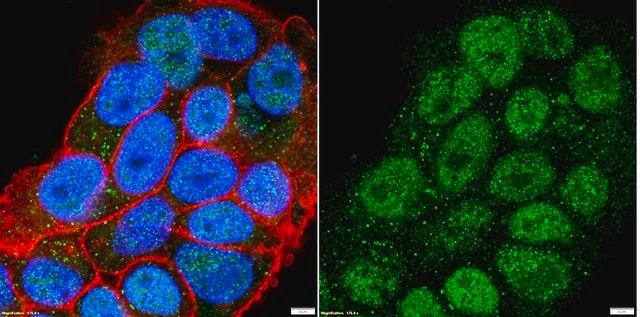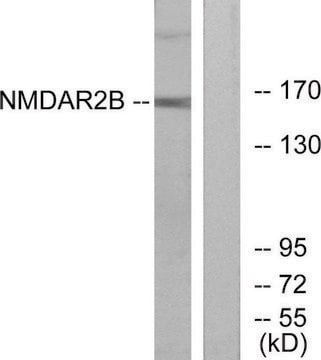MAB5778
Anti-NMDAR2B Antibody, CT
ascites fluid, clone 1C6.5C4, Chemicon®
Sign Into View Organizational & Contract Pricing
All Photos(1)
About This Item
UNSPSC Code:
12352203
eCl@ss:
32160702
NACRES:
NA.41
Recommended Products
biological source
mouse
Quality Level
antibody form
ascites fluid
clone
1C6.5C4, monoclonal
species reactivity
human, rat, rabbit, mouse
manufacturer/tradename
Chemicon®
technique(s)
western blot: suitable
isotype
IgG1
NCBI accession no.
UniProt accession no.
shipped in
dry ice
target post-translational modification
unmodified
Specificity
NMDAR2B, C-terminal. By Western blot the antibody reacts with a band at ~170 kDa on rat brain lysate.
Immunogen
Recombinant protein from rat NMDAR2B.
Application
Research Category
Neuroscience
Neuroscience
Research Sub Category
Neurotransmitters & Receptors
Neurotransmitters & Receptors
This Anti-NMDAR2B Antibody, C-terminal is validated for use in WB for the detection of NMDAR2B.
Western blot: 1:100-1:1,000 on rat brain lysate.
Optimal working dilutions must be determined by end user.
Optimal working dilutions must be determined by end user.
Physical form
Ascites
Liquid ascites.
Storage and Stability
6 months at -20°C from date of shipment
Legal Information
CHEMICON is a registered trademark of Merck KGaA, Darmstadt, Germany
Disclaimer
Unless otherwise stated in our catalog or other company documentation accompanying the product(s), our products are intended for research use only and are not to be used for any other purpose, which includes but is not limited to, unauthorized commercial uses, in vitro diagnostic uses, ex vivo or in vivo therapeutic uses or any type of consumption or application to humans or animals.
recommended
Product No.
Description
Pricing
Storage Class Code
10 - Combustible liquids
WGK
WGK 1
Flash Point(F)
Not applicable
Flash Point(C)
Not applicable
Certificates of Analysis (COA)
Search for Certificates of Analysis (COA) by entering the products Lot/Batch Number. Lot and Batch Numbers can be found on a product’s label following the words ‘Lot’ or ‘Batch’.
Already Own This Product?
Find documentation for the products that you have recently purchased in the Document Library.
Kyeong-No Yoon et al.
The British journal of nutrition, 131(7), 1105-1114 (2023-11-29)
Brain ageing, the primary risk factor for cognitive impairment, occurs because of the accumulation of age-related neuropathologies. Identifying effective nutrients that increase cognitive function may help maintain brain health. Tomatoes and lemons have various bioactive functions and exert protective effects
Matthew T Swulius et al.
The Journal of comparative neurology, 518(20), 4243-4260 (2010-09-30)
In this study, we used electron tomography as well as immunogold labeling to analyze the morphology and distribution of proteins within postsynaptic densities (PSDs) isolated from rats before birth (embryonic day 19) and at postnatal days 2, 21, and 60.
GluN2B protein deficits in the left, but not the right, hippocampus in schizophrenia.
Geddes, AE; Huang, XF; Newell, KA
BMC Psychiatry null
Marie Lise Frandemiche et al.
The Journal of neuroscience : the official journal of the Society for Neuroscience, 34(17), 6084-6097 (2014-04-25)
Tau is a microtubule-associated protein well known for its stabilization of microtubules in axons. Recently, it has emerged that tau participates in synaptic function as part of the molecular pathway leading to amyloid-beta (Aβ)-driven synaptotoxicity in the context of Alzheimer's
Wenhui Qu et al.
The Journal of neuroscience : the official journal of the Society for Neuroscience, 40(50), 9552-9563 (2020-11-04)
Triggering receptor expressed on myeloid cells 2 (TREM2), a receptor exclusively expressed by microglia in the brain, modulates microglial immune homeostasis. Human genetic studies have shown that the loss-of-function mutations in TREM2 signaling are strongly associated with an elevated risk
Our team of scientists has experience in all areas of research including Life Science, Material Science, Chemical Synthesis, Chromatography, Analytical and many others.
Contact Technical Service







